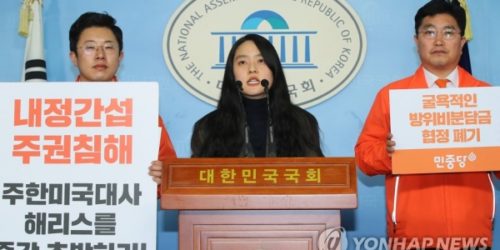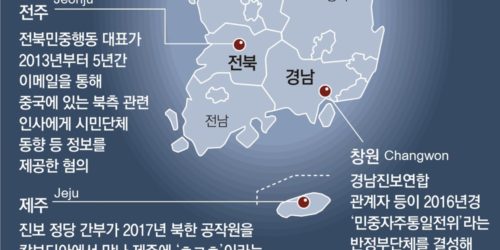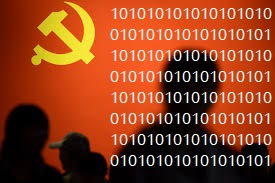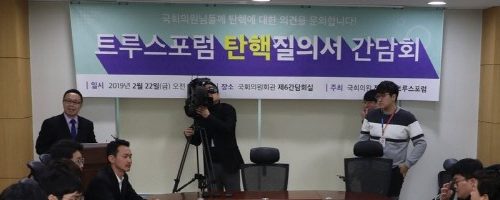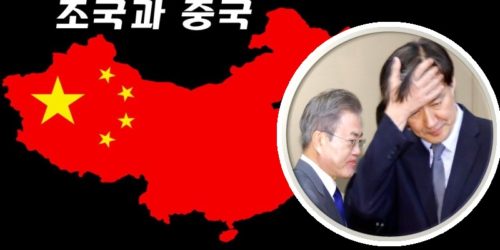Changing the Constitution: Some South Korean Lawmakers Surreptitiously Propose to Change the Constitution if 2% of the Population Agree
2020-3-10, Tara O
In a surprise move, and amidst the Coronavirus outbreak, a group of lawmakers tabled a bill– “One Point Constitutional Amendment”– to change South Korea’s Constitution, if 1,000,000 people (or less than 2% of the population) agree to change it. These lawmakers made no efforts to hold a public discourse or to explain to the public about what parts of the constitution need to change or why the constitution needs to be changed. The reason the lawmakers gave was that the constitution has not been changed in 33 years and that they want “public square democracy” to be “voting democracy.” They quietly submitted the proposed amendment to the Bills’ Affairs Department at the National Assembly on March 6, 2020. That fact was discovered two days later. South Korea’s major media are not covering this important issue. Criticisms from the public and other lawmakers are mounting.
On March 8, 2020, the “National Constitutional Reform Solidarity” (국민발안개헌연대), with the participation of 25 other civil organizations, including the Korean Confederation of Trade Union (KCTU, 민주노총), People’s Solidarity for Participatory Democracy (PSPD, 참여연대), Citizens’ Coalition for Economic Justice (경제정의실천시민연합), and the Korean Constitutional Association, (대한민국헌정회), held a press conference at the National Assembly to announce the tabling of the amendment bill with the support of 148 lawmakers and stated it will “complement representative democracy by institutionally guaranteeing [direct] public participation, turning “public square democracy” into “voting democracy.”
Currently, a constitutional amendment can be brought only by the president or a 2/3 majority of the National Assembly. The new motion adds that a group of 1,000,000 voters can also propose changes to the Constitution. Given that South Korea’s population is more than 51 million, 1 million is hardly a majority of the South Korean population. The KCTU, also called Minjoo Nochong and one of the participating organizations pushing for the constitutional amendment, alone has over 1 million members. KCTU often participates in political demonstrations–the “public square democracy” mentioned above–including the anti-U.S. beef imports/Mad Cow, anti-THAAD, Park Geun-hye impeachment candlelight, and Sewol Ferry rallies. They often behave violently toward police and others, with no repercussions.
After the National Assembly proposes a constitutional amendment, the president must make it public for at least 20 days, and if the 2/3 majority at the National Assembly passes the bill, then it goes for a public referendum within 30 days. If the majority of electorates and voters agree, then the constitution is amended.
148 of 295 is 50.16%, so to achieve the 2/3 majority to place this item up for referendum, 47 more votes will be needed to reach the required195 votes (2/3 majority).
The April 15 general election is just around the corner. If the proposed bill passes the plenary session, it will be ready in time to be added as a referendum to coincide with the election day, when the voter turnout is greater than if the referendum were held on another date.
Criticisms
Although 22 United Future Party members took part in proposing the bill, others in the same party are criticizing the signatories’ actions.
At the Supreme Council of the National Assembly, Shim Jae-cheol (심재철), the floor leader of the United Future Party, stated, “22 of our party members, including Kim Moo-sung, went along with the proposal to change the constitution, which proposes that if 1 million voters or more participate, then they can independently amend the constitution. KCTU or Jeongyojo (Korean Teachers and Education Workers’ Union) can [quickly] mobilize 1 million [people]. It’s obvious how the voters’ initiatives will be used.”
The legal profession was also concerned. Lawyer Hong Se-wook (홍세욱) said, “1 million people is less than one tenth of voters. The constitution is the framework of our country. It is problematic to allow a tiny minority of people to propose changes to the constitution. Big parties can quickly mobilize 1 million people and use it for political purposes.”
The Liberty Republican Party spokesperson Kim Young (김영) criticized the “One Point Constitutional Amendment” stating that it was slipped through without any public hearing, and that the major media are remaining silent on the issue. Kim lamented that this is a revival of the failed attempt by Moon Jae-in and his party to incorporate socialism into the constitution in March 2018, which the Liberty Korea Party prevented.
Both the Deobureo Minjoo Party and Moon Jae-in, on separate occasions, tried to change the constitution in 2018. The ruling party wanted to replace “liberal democracy as the basic order of the Republic of Korea” with “democracy as the basic order of the Republic of Korea,” deleting the concept of freedom. (North Korea calls itself a “people’s democracy,” which is different from “liberal democracy.”) It also wanted to add numerous KCTU-friendly clauses, such as “guarantee of labor union participation in management” and “no dismissal (of employees)” in the constitution–concepts that are contrary to the market economy, but in line with socialism.
A recently formed group of 6,094 professors from 377 universities across the country, the Professors’ Solidarity for Freedom and Justice (PSFJ or JeongGyoMo), denounced the move and demanded the lawmakers immediately withdraw the amendment proposal. JeongGyoMo stated “the country is paralyzed by the coronavirus outbreak, and the National Assembly slipped through a proposal that allows anyone to initiate changes to the constitution.”
The professors’ group further stated “It’s not an exaggeration to say the national identity is in the Constitution…The proposal means that changing any clauses in the Constitution [and subsequently] the national identity is possible with just one million petitions…If you look at the number of people who have participated in the Blue House petitions recently, it is not difficult to gather 1 million supporters…This is just a means for the entities that are well-organized to mobilize (the needed numbers)…In other words, it means the Constitution of the Republic of Korea would be continuously at the mercy of different interest groups. It’s clear that social confusion would arise, leading to a crisis of democracy that is bigger and more dangerous than ‘public square democracy.’”
Who introduced the bill?
Kang Chang-il (강창일) of the ruling Deobureo Minjoo Party (Democratic Party of Korea) and Kim Moo-sung (김무성) of the main opposition Unified Future Party (미래통합당) led the motion, and 148 lawmakers supported the motion. Currently 295 lawmakers are at the National Assembly (normally 300). The following political parties participated (in order of numbers agreeing):
- Deobureo Minjoo Party (더불어민주당) (ruling party): 92
- Unified Future Party (미래통합당) [formed on February 17, 2020 by merging the members of the Liberty Korea Party, New Conservative Party (broke away from Baruenmirae Party), Moving Toward the Future Party, Brand New Party, and We Up Party]: 22
- Party for People’s Livelihoods (민생당), (formed on February 24, 2020 by merging members from Bareunmirae Party, New Alternatives Party, and Democracy and Peace Party): 18
- Justice Party (정의당): 6 (all)
- Minjoong Party (민중당, means proletariat party) (The party is a remnant from the banned Unified Progressive Party): 1
- Future Korea Party (미래한국당): 1
Specifically, the following 148 lawmakers agreed on the constitutional amendment.
Unified Future Party (미래통합당): 22
- Kang Seok-ho 강석호
- Kim Moo-sung 김무성
- Kim Sam-hwa 김삼화
- Kim Sung-tae 김성태
- Kim Su-min 김수민
- Kim Yong-tae 김용태
- Kim Hack-yong 김학용
- Park Myung-jae 박명재
- Baek Seung-joo 백승주
- Shin Yong-hyeon 신용현
- Ahn Sang-soo 안상수
- Yeo Sang-kyoo 여상규
- Yoo Min-bong 유민봉
- Lee Myoung-su 이명수
- Lee Jong-koo 이종구
- Lee Jong-bae 이종배
- Lee Hye-hoon 이혜훈
- Jang Seok-chun 장석춘
- Jeong Kab-yoon 정갑윤
- Choung Byoung-gug 정병국
- Chung Jin-suk 정진석
- Hong Il-pyo 홍일표
Future Korea Party (미래한국당): 1
- Jeong Woon-chun 정운천
Justice Party (정의당): 6
- Kim Jong-dae 김종대
- Sim Sang-jeung 심상정
- Yeo Young-kug 여영국
- Youn So-ha 윤소하
- Lee Jeong-mi 이정미
- Chu Hye-seon 추혜선
Party for People’s Livelihoods (민생당): 18
- Kim Kwang-soo 김광수
- Kim Jong-hoe 김종회
- Park Sun-sook 박선숙
- Park Joo-sun 박주선
- Park Joo-hyun 박주현
- Park Jie-won 박지원
- You Sung-yop 유성엽
- Yoon Young-il 윤영일
- Chang Byoung-wan 장병완
- Chang Jung-sook 장정숙
- Chung Dong-young 정동영
- Cho Bae-sook 조배숙
- Joo Seung-yong 주승용
- Chae Yi-bai 채이배
- Chun Jung-bae 천정배
- Choi Gyung-hwan 최경환
- Choi Do-ja 최도자
- Hwang Ju-hong 황주홍
Minjoong Party (민중당): 1
- Kim Jong-hoon 김종훈
People’s Party (국민의당): 2
- Kwon Eun-hee 권은희
- Lee Tae-kyu 이태규
Unaffiliated: 6
- Kang Ghil-boo 강길부
- Kim Kyung-jin 김경진
- Kim Kwan-young 김관영
- Lee Yong-joo 이용주
- Lee Yong-ho 이용호
- Jeong In-hwa 정인화
Deobureo Minjoo Party (더불어민주당): 92
- Kang Chang-il 강창일
- Kang Hoon-sik 강훈식
- Ki Dong-min 기동민
- Kim Kyung-hyup 김경협
- Kim Du-kwan 김두관
- Kim Min-ki 김민기
- Kim Byoung-gwan 김병관
- Kim Byung-wook 김병욱
- Kim Boo-kyum 김부겸
- Kim Sang-hee 김상희
- Kim Youn-joo 김영주
- Kim Young-choon 김영춘
- Kim Young-ho 김영호
- Kim Jung-ho 김정호
- Kim Jong-min 김종민
- Kim Jin-pyo 김진표
- Kim Cheol-min 김철민
- Kim Tae-nyeon 김태년
- Kim Han-jung 김한정
- Koh Yong-jin 고용진
- Kwon Mi-hyuk 권미혁
- Kwon Chil-seung 권칠승
- Keum Tae-sup 금태섭
- Nam In-soon 남인순
- Noh Woong-rae 노응래
- Do Jong-hwan 도종환
- Maeng Sung-kyu 맹성규
- Min Byung-doo 민병두
- Park Kyung-mee 박경미
- Park Kwang-on 박광온
- Park Beom-kye 박범계
- Park Jeung 박정
- Park Chan-dae 박찬대
- Park Hong-keun 박홍근
- Baek Jae-hyun 백재현
- Back Hye-ryun 백혜련
- Seo Sam-seok 서삼석
- Seo Young-kyo 서영교
- Seo Hyung-soo 서형수
- So Byung-hoon 소병훈
- Son Kum-ju 손금주
- Song Gab-seok 송갑석
- Song Young-gil 송영길
- Song Ok-joo 송옥주
- Shin Kyoung-min 신경민
- Shin Dong-keun 신동근
- Shin Chang-hyun 신창현
- Shim Ki-joon 심기준
- Shim Jae-kwon 심재권
- Ahn Gyu-back 안규백
- An Min-suk 안민석
- An Ho-young 안호영
- Eoh Kiy-ku 어기구
- Oh Young-hoon 오영훈
- Oh Jae-sae 오제세
- Woo Sang-ho 우상호
- Woo Won-shik 우원식
- Won Hye-young 원혜영
- Wi Seong-gon 위성곤
- Yoo Dong-soo 유동수
- You Seung-hee 유승희
- Yun Il-gyu 윤일규
- Yun Ho-jung 윤호중
- Yoon Hu-duk 윤후덕
- Lee Kai-ho 이개호
- Lee Sang-min 이상민
- Lee Sang-heon 이상헌
- Lee Seok-hyun 이석현
- Lee Yong-deuk 이용득
- Lee Won-wook 이원욱
- Lee Jong-kul 이종걸
- Rhee Cheol-hee 이철희
- Lee Hack-young 이학영
- Lee Hu-sam 이후삼
- Lee Hoon 이훈
- In Jae-keun 인재근
- Lim Jong-seong 임종성
- Chun Jae-soo 전재수
- Jeon Hyun-heui 전현희
- Jung Sung-ho 정성호
- Jung Jae-ho 정재호
- Jung Choun-sook 정춘숙
- Je Youn-kyung 제윤경
- Jo Seung-lae 조승래
- Cho Jeong-sik 조정식
- Jin Sun-mee 진선미
- Choi Woon-youl 최운열
- Choi Jae-sung 최재성
- Han Jeoung-ae 한정애
- Hong Eui-rak 홍의락
- Hong Ihk-pyo 홍익표
- Hwang Hee 황희
The “One Point Constitutional Amendment” proposal, which was supported by half of the National Assembly members, is troubling. If it passes, then less than 2% of South Korea’s population can change the constitution and impact the other 98% of society. Organizations like the KCTU can easily mobilize 1 million members, and could constantly demand the constitution be changed to serve their own political interests. In effect, this would destabilize the foundation of South Korea. There will be no rule of law, when small factions can constantly create changes to the country’s highest law, the constitution. The way these lawmakers proposed this amendment and its timing are problematic as well. It was submitted quietly without discussions, while the public’s attention was focused on dealing with the Wuhan coronavirus (COVID-19). It is as if they did not want the public to find out and oppose the proposal. The fact that 22 of the lawmakers who signed the proposal are from the biggest opposition party (an amalgamation of the former Liberty Korea Party and other parties) is shocking as well. Two years ago, the Moon administration and the Deobureo Minjoo Party tried to delete the concept and elements of liberal democracy and market economy from the constitution. They also rushed to try to place the constitutional amendment on the ballot to coincide with the general election at that time. It appears the same forces are continuing their work undermining the identity and stability of the Republic of Korea.

